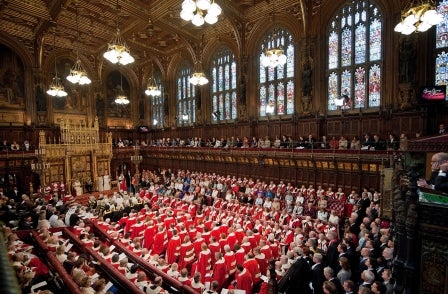
Peers have threatened a legislative tussle after the Government said it would overturn House of Lords votes for tighter regulation of the press.
The warning of parliamentary ping pong, where a Bill is passed between the two Houses, came as new Culture Secretary Matt Hancock was described as “churlish” over his criticism of the changes backed by unelected members.
Peers inflicted a double defeat on the Government’s Data Protection Bill last week, passing two amendments to regulate the media and back the launch of the second phase of the Leveson Inquiry into press standards.
Hancock accused the Lords of voting to curb press freedom and said it would be a “hammer blow” to local newspapers. Both he and Prime Minister Theresa May have said they would reverse the votes.
Hancock’s comments were picked up by Liberal Democrat frontbencher Lord Clement-Jones last night, during the Bill’s third reading, before it was sent to the House of Commons.
Describing the vote for Leveson Two as “one of the triumphs of debate in this House”, he said: “The response of the Secretary of State, whose appointment I very much welcomed at the time, was rather churlish.”
Lord Clement-Jones also said Hancock’s further remarks that the changes imposed by the Lords represented the “death knell” of democracy was “pretty strong and unnecessary language”, and added: “I very much hope that a sensible agreement to proceed is reached before we start having to play ping-pong.”
In addition to backing an investigation into alleged data protection breaches by the media, peers also supported a controversial measure which would see newspapers not signed up to a state-supported regulator pay their own and their opponent’s legal costs in relation to alleged data protection breaches, as well as privacy and defamation claims, even if they won the cases in court.
The provision, under Section 40 of the Crime and Courts Act, has been strongly opposed by the majority of the UK press as it is seen as a means of coercing them to sign up to state-approved press regulation.
Only those publishers who are members of a press regulator recognised under the Royal Charter system – currently this is only Impress, which serves fewer than 100 publications – would avoid the cost penalties.
The majority of the UK press are signed up to the Independent Press Standards Organisation (IPSO) which has said it will not seek Royal Charter recognition.
The result of a public consultation on whether to impose Section 40, which has been enacted but not yet enforced, and whether to pursue Leveson Two, has been delayed by the intervention of Lord Leveson who said he wished to examine newspaper publishers’ responses himself.
Email pged@pressgazette.co.uk to point out mistakes, provide story tips or send in a letter for publication on our "Letters Page" blog

